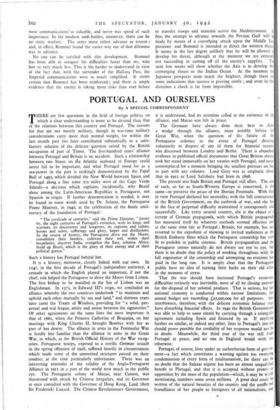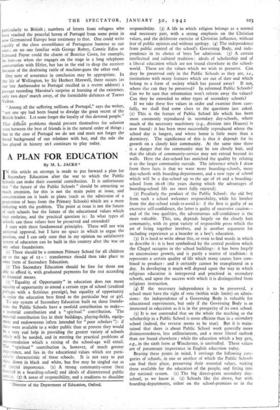PORTUGAL AND OURSELVES
By A SPECIAL CORRESPONDENT
THERE are few questions in the field of foreign politics on which a clear understanding is more 'to be desired than that of the relations between this country and Portugal. The reasons for that are not merely military, though in war-time military considerations carry more than normal weight, for within the last month past ties have contributed substantially to a satis-
factory solution of the delicate question raised by the British occupation of part of Timor. The five-hundred years' alliance between Portugal and Britain is no accident. Such a relationship between two States on the Atlantic seaboard of . Europe could never fail to be important, and what Portugal stood for as a sea-power in the past is strikingly demonstrated by the Papal Bull of 1493, which divided the New World between Spain and Portugal along a line some 370 miles west of the Cape Verde Islands—a decision which explains, incidentally, why Brazil alone among the Latin-American Republics is Portuguese, not Spanish in origin. If further demonstration is needed, it may be found in some words used by Dr. Salazar, the Portuguese
Prime Minister, in 1940, at the celebration a the 800th anni- versary of the foundation of Portugal:
" The cavalcade of centuries," said the Prime Minister, " passes by, the eight centuries of Portugal's existence, with its kings and warriors, its discoverers and lawgivers, its captains and sailors, heroes and saints, sufferings and glory, hopes and disillusions. In the course of history, the Portuguese drive out the Moors, consolidate their borders, cultivate their soil, widen their boundaries, discover India, evangelise the East, colonise Africa, build up Brazil, which is the glory of their energy and of their political genius."
Such a history has Portugal behind her.
It is a history, moreover, closely linked with our own. In 1147, in the first decade of Portugal's independent existence, a crusade in which the English played an important, if not the chief, role helped the Portuguese to drive the Moors from Lisbon. The first bishop to be installed in the See of Lisbon was an Englishman. In 1373, in Edward III's reign, we concluded an alliance whereby the two countries undertook " to maintain and
uphold each other mutually by sea and land," and thirteen years later came the Treaty of Windsor, providing for " a solid, per- petual and real league, amity and union between the signatories." Of other agreements on the same lines the most important is that of 1661, when the Princess Catherine of Braganza, on her marriage with King Charles II, brought Bombay with her as part of her dowry. The alliance in arms in the Peninsular War
is hardly less familiar than the alliance in arms in the Great War, in which, as the British Official History of the War recog-
nises, Portuguese troops, exposed to a terrific German assault in the spring offensive of 1918, suffered heavily in circumstances which made some of the unmerited strictures passed on their conduct at the time particularly unfortunate. There was an interesting reminder of the validity of the Anglo-Portuguese
Alliance in 1911 in a part of the world now much in the public eye. The Portuguese colony of Macao, near Canton, was
threatened with attack by Chinese irregulars, and its Governor at once consulted with the Governor of Hong Kong, Lord (then Sir Frederick) Lugard. .The Chinese Revolutionary Government, it is understood, had its attention called to the existence of the alliance, and Macao was left in peace.
The Germans have always done their best to drive a wedge through the alliance, most notably before the Great War, when the question of the future of the Portuguese colonies in the event of Portugal desiring voluntarily to dispose of any of them for financial reasons was discussed between London and Berlin. There is abundant evidence in published official documents that (reat Britain always took her stand immovably on her treaties with Portugal, and never contemplated for a moment bringing the smallest pressure on her to part with any colonies. Lord Grey was as emphatic about that in 1912 as Lord Salisbury had been in 1898.
The present war finds Britain and Portugal still allies. The air of each, so far as South:-Western Europe is concerned, is the same—to preserve the peace of the Iberian Peninsula. With that in view Portugal declared her neutrality, with the full concurrence of the British Government, on the outbreak of war, and she has in the face of perpetual difficulty maintained it courageously and successfully. Like every neutral country, she is the object of a torrent of German propaganda, with which British propaganda has measured itself by whatever methods seemed effective and at the same time fair to Portugal ; Britain, for example, has nor resorted to the expedient of showing to invited audiences at the British Embassy films which the Portuguese censorship has seen fit to prohibit in public cinemas. British propagandists and the Portuguese censor naturally do not always see eye' to eye, but there is no doubt that the policy of working throughout with the full cognisance of the censorship and attempting no evasions has paid in the long run. It is amply clear that the Portuguese public have no idea of turning their backs on their old allies in the moment of stress.
That the war should have increased Portugal's economic difficulties seriously was inevitable, most of all by closing avenue for the disposal of her colonial produce. That is serious, for her national economy is conducted within narrow limitations, her annual budget not exceeding £25,000,000 for all purposes. Any interference, therefore, with the delicate economic balance may have disturbing financial effects. In 1940 the British Government was able to help to some extent by carrying through a triangular agreement including Spain and financed by us. If anything further on similar, or indeed any other, lines in Portugal's interest should prove possible the cordiality of her response would not be in doubt. Meanwhile, the third year of the war still finds Portugal at peace, and no one in England would wish her otherwise.
Portugal, of course, lives under an authoritarian form of govern- ment—a fact which constitutes a warning against too sweeping condemnation of every form of totalitarianism, for there can he no doubt that the Salazar regime has been an almost unqualified benefit to POrtugal, and that it is accepted without protest Or opposition by the mass of the population—which, it may be worth mentioning, numbers some seven millions. A great deal could he written of the natural beauties of the country and the unaffected friendliness of her. people to foreigners of all nationalities, and particularly to British ; numbers of letters from refugees who have reached the peaceful haven of Portugal from some point in now Germanised Europe bear testimony, to that. One could write equally of the close resemblance of Portuguese humour to our own ; on no one familiar with George Robey, Connie Ediss or Edmund Payne could the charm of Beatrice Costa, for example, be lost=as when she engages on the stage in a long telephone conversation with Hitler, but has in the end to drop the receiver because of the deafening rattle of machine-guns the other end.
One note of assurance in conclusion may be appropriate. In the life of Wellington, by Sir Herbert Maxwell, there occurs (as our late Ambassador to Portugal recalled in a recent address) a passage recording Massena's surprise at learning of the existence, only two days' march away, of the formidable defences of Torres Vedras.
" Among all the suffering millions of Portugal," says the writer, " not one spy had been found to divulge the great secret of the British leader. Let none forget the loyalty of this devoted people." That difficUlt problems should present themselves for solution even between the best of friends is in the natural order of things ; but in the case of Portugal we do not and must not forget the broad background of our relations with her, and the role she has played in history ani continues to play today.



























 Previous page
Previous page